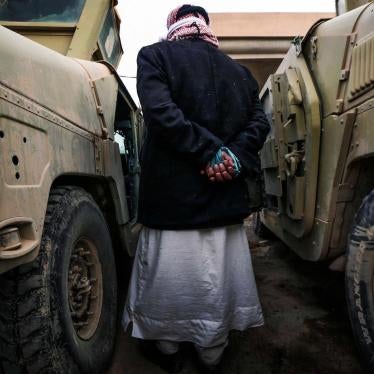The Israeli government should reject plans to resume the demolition or confiscation of the homes of alleged terrorists, Human Rights Watch said today. These measures would violate international legal prohibitions against collective punishment, as they affect the owners or inhabitants of the homes who have no involvement in terrorism.
The call follows an order issued on August 6, 2008, by Israeli Defense Minister Ehud Barak to demolish the home of Alaa Abu Dheim, a 26-year-old Palestinian who killed eight people during a gun attack on a Jewish seminary in Jerusalem in March. The house concerned does not belong to Abu Dheim but is occupied and owned by his relatives. Barak’s order marks the resumption of demolitions of homes after a three-year lull and comes in the wake of two separate attacks in which Palestinian men used bulldozers to attack people in July on the streets of Jerusalem.
“The assault on Mercaz Harav seminary and the more recent bulldozer attacks were appalling, but Israel shouldn’t respond by trampling on basic rights,” said Sarah Leah Whitson, Middle East director at Human Rights Watch. “The house demolition measures would violate international law because they punish people who are not even accused, let alone convicted, of a crime.”
Israel had abandoned the policy of house demolitions in 2005, when a panel of its own military experts rejected it, after concluding the policy was ineffective for tackling terrorism and possibly counterproductive. But there have been mounting calls by senior government officials, including Prime Minister Ehud Olmert, to resume the practice after the bulldozer attacks, which killed three people and wounded scores more. There is no evidence that the men involved in either attack had ties to militant groups.
Article 53 of the Fourth Geneva Convention, which governs military occupations, forbids the demolition of houses in the Occupied Palestinian Territories except where “absolutely necessary” for military operations. In addition, such demolitions punish family members and others living in the building solely for residing in the same home as an alleged terrorist. Under Israel’s policy, the fact that the owner of the building is neither the alleged terrorist nor related to him does not protect him from demolition of his property. Therefore such demolitions violate article 33 of the Fourth Geneva Convention, which prohibits punishing someone for an offense that he or she had not personally committed, and forbids collective penalties.
Abu Dheim’s relatives have one week in which to appeal to the Ministry of Defense. If that fails, they are entitled to appeal to Israel’s Supreme Court, according to Israeli media reports.
Defense officials claim that military law dating back to the British mandate in Palestine gives the Israel Defense Forces (IDF) the right to destroy the homes of anyone accused of involvement with terrorism.
The mandate-era regulations were used between 2000 and 2005 by the IDF to demolish 668 homes, rendering more than 4,000 people homeless, without providing them with alternative housing, according to the Israeli rights group B’Tselem. The demolitions took place often with short notice and without giving the homeowners the possibility of legal review.
“Proposals to allow the Israel Defense Forces to resume the collective punishment of house demolitions would mark a substantial step backward in Israel’s respect for human rights – a return to illegality,” said Whitson.
The Ministry of Defense is also considering issuing demolition orders for the homes of the two bulldozer drivers.
On July 2, Hossam Dwayyat, a 31-year-old Palestinian road worker with a history of emotional instability and drug abuse, used a bulldozer to strike motorists, pedestrians and a bus, killing three people. Security officers eventually shot Dwayyat dead at the wheel of the bulldozer. On July 22, Ghassan Abu Tir, a 22-year-old Palestinian, injured at least 10 people, including a baby, in an attack that seemed to imitate Dwayyat’s. He was also shot and killed at the scene. Neither Dwayyat nor Abu Tir was the sole owner of his home.
Legislators from the opposition Likud party have proposed various new measures, including a bill that would authorize the government to confiscate property belonging to alleged terrorists. New plans currently before the Knesset would reinforce the Ministry of Defense’s use of British mandate regulations by allowing the state to confiscate the residence of someone suspected of involvement in terrorism, whether they own the home or not. Members of the ruling coalition have indicated they will not support the bill, but the government is still advocating it.
Forced evictions and unlawful house demolitions, without any consideration of the rights of those living there, also constitute arbitrary interference with the home, which is prohibited by article 17 of the International Covenant on Civil and Political Rights. Israel is under a duty to ensure that everyone in the areas it controls has access to adequate housing, even after lawful evictions, under article 11 of the International Covenant on Economic, Social and Cultural Rights. Israel has ratified both covenants.
“Punishing people for the crimes of others is no solution to terrorism,” said Whitson. “Israel should focus on bringing to justice those who actually plan or carry out attacks.”








